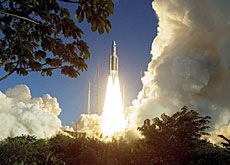
Space agency marks 30 years since lift-off

The European Space Agency (ESA) – which turned 30 on Tuesday - has gone from launching satellites into outer space to searching for life on Mars.
Switzerland was one of the founding members of the ESA, which was established on May 31, 1975, to advance the cause of European space research.
The Paris-based ESA sent its first satellite into orbit in 1975 and over the past three decades has made it its mission to develop and coordinate space programmes in Europe.
Switzerland is one of 16 ESA member states and contributes around SFr130 million ($105 million) to the agency’s annual budget of more than SFr4 billion.
Swiss scientists and companies have been involved in the development and implementation of many ESA projects – most recently with the Huygens probe, which earlier this year sent back the first pictures of Saturn’s largest moon, Titan.
The agency has had its share of successes and failures over the past 30 years. Its first significant milestone was the launch of the first Ariane rocket in 1979.
One of the ESA’s most high-profile setbacks in recent years was its bungled unmanned mission to Mars.
The Beagle 2 probe, which had been expected to land on the surface of the red planet, vanished without a trace in December 2003.
Success story?
But Marc Bertschi, director of the Swiss Space Office (SSO), says the successes over the past three decades far outweigh the disappointments.
“We should realise today that a number of things we take for granted in daily life depend on space systems,” he told swissinfo.
“Meteorology and telecommunications, for example, would be unthinkable without satellites.”
Bertschi adds that Switzerland has succeeded in establishing a reputation for itself within the ESA as an important source of scientific expertise.
“The scientific presence of Switzerland within the ESA’s programmes by far exceeds the [amount of money] the country contributes to the agency.
“We are one of the smaller member states but still have an important role to play.”
Swiss challenge
Bertschi took charge of the SSO just over two months ago. Prior to his appointment he was head of ESA Director-General Jean-Jacques Dordain’s policy office.
He expresses concern that Switzerland could lose out in the field of space research as the ESA and European Union – of which the country is not a member – move closer together.
“Sometimes it is difficult to make other delegations understand that we do not want to lose out as the relationship between the ESA and the EU evolves,” he said.
Around 800 people in Switzerland are directly involved in the space industry, but this number rises to as many as 3,000 if companies which win sub-contracts to work on space projects are taken into account.
The SSO has in the past called on the government to increase Switzerland’s contribution to European space research.
Bertschi rejects any suggestion that space research, including projects like the International Space Station, is a waste of money.
“You know who spends the most on space research in the world? It’s not the ESA or Nasa, but the United States Air Force,” he said. “I think this is a clear sign that space is important for national security.”
Future direction
As the ESA marks its first three decades, Bertschi believes many challenges still lie ahead for European space researchers.
“The rise in the number of space systems being developed for defence and security is a general trend which is unlikely to slow down as China emerges as a major world power,” he said.
“But the future of manned space flights is very much open – in particular the speed with which we get humans back to the moon and then on to Mars.”
The botched Beagle 2 mission does not mean the ESA has abandoned attempts to search for life on other planets.
Last month the agency confirmed its intention to make another attempt to land on Mars.
If plans for the mission are successful, a roving robot will leave Earth in June 2011 and touch down on the planet two years later.
swissinfo, Ramsey Zarifeh
The first European ministerial conference on space was held in Switzerland in 1960.
The European Space Agency was formally established on May 31, 1975.
Its job is to draw up and implement a European space programme.
It has 16 member states: Austria, Belgium, Britain, Denmark, Finland, France, Germany, Greece, Ireland, Italy, the Netherlands, Norway, Portugal, Spain, Sweden and Switzerland.
The ESA has a staff of just over 1,900.

In compliance with the JTI standards
More: SWI swissinfo.ch certified by the Journalism Trust Initiative




























You can find an overview of ongoing debates with our journalists here . Please join us!
If you want to start a conversation about a topic raised in this article or want to report factual errors, email us at english@swissinfo.ch.